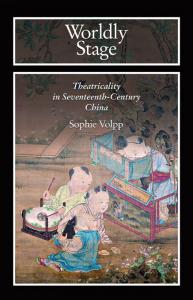Berkeley Books: Worldly Stage: Theatricality in Seventeenth-Century China

In an early seventeenth-century Chinese drama, The Real Puppet (Zhen kuilei), a retired official traveling in the countryside is watching a village puppet theater in which actors are dressed up as puppets, when he is unexpectedly called upon to perform an imperial ceremony. Pressed to find an appropriate court robe, the official—to the surprise of the onstage crowd—borrows the robe of a human puppet dressed as a prime minister. The play concludes with the official’s remarks:
The question is at the heart of this month’s Berkeley Books selection, Worldly Stage: Theatricality in Seventeenth-Century China, in which author Sophie Volpp also asks, "what constitutes an authentic (zhen) spectator?" Volpp, who teaches in both the Department of Comparative Literature and the Chinese Program in East Asian Languages and Cultures, explores how the theatrical mode of spectatorship cultivated forms of social and cultural spectatorship in the long seventeenth century (1570-1720, from the late Ming to the early Qing eras).
Volpp organizes her chapters around the evolving metaphor of the world as a stage. The introduction and the first two chapters lay out the context, the staging practices, and the figure of the theater. She argues that the theater stood at once for the discrepancy between illusion and actuality, wherein acting signified social posturing, and an awareness that one is tantamount to the other. In one example, an omniscient observer coolly evaluates some merrymakers, themselves spectators of the full moon, only to enter the scene and mingle with them, erasing the distinction between observation and participation, spectator and actor. Sophisticated perception had to do with such an ability to invert and self-reflect. In the succeeding chapters, Volpp analyzes a set of dramatic texts to bring out the intricate dialectics of illusion and disillusion. Chapters three and four compare Tang Xianzu’s Mudan ting (The Peony Pavilion) and Wang Jide’s Nan wanghou (The Male Queen) to consider the cultural politics of literary citation; the former lampoons the literary trend of archaism misused by the nouveau riche while the latter challenges the authenticity of historical models using a crossed-dressed actor with multiple allusions to gender. The last two chapters delve into the spectatorship of “homosocial homoerotics” staged in Chen Weisong’s poetry of longing for the boy actor Xu Ziyun and in the historical relationships between the literati and the actors at large.
The episode of the retired official, an example taken from the book’s conclusion, shows identification—the attachment between the spectator and the actor—to be central to seventeenth-century theatricality. Volpp thus refutes the “romanticization” of the classical Chinese theater as anti-theatrical, inherently operating through alienation (as Bertolt Brecht argued) or exhibiting “hollowness” and “separation” (according to Samuel Weber) that discounts audience empathy. If her reading of theatricality and the literati relationship to classical theater “has relevance to contemporary writing on western theater, it is because classical Chinese theater has long furnished a vision of an alternative tradition in which Plantonic illusions of presence could be replaced by an effortlessly self-critical theater.” On the contrary, refined spectatorship depended on absorption as much as disengagement. The emotional intensity Volpp picks up in the texts, notes Patricia Sieber in the American Historical Review, “draws attention to empathy as an important facet of the cult of genuine emotion” and feelings as the aesthetic “object of self-dramatization and of sophisticated spectatorship.” Tian Yuan Tan’s review in the Harvard Journal of Asiatic Studies also notes the book’s contribution to opening up the field, “not only provid[ing] fresh interpretations of classics” but also “introduc[ing] lesser-known dramatic works” and an array of other forms of literary texts in late imperial China.
Visit the Biblio-file to view books that shaped Professor Volpp’s thinking while working on Worldly Stage.
Sookyoung Lee is a Graduate Student Researcher at the Townsend Center for the Humanities.